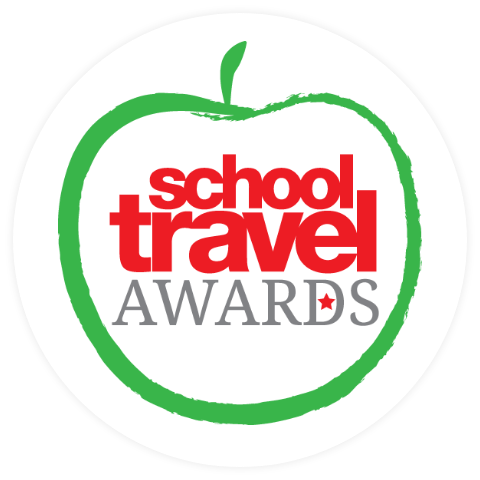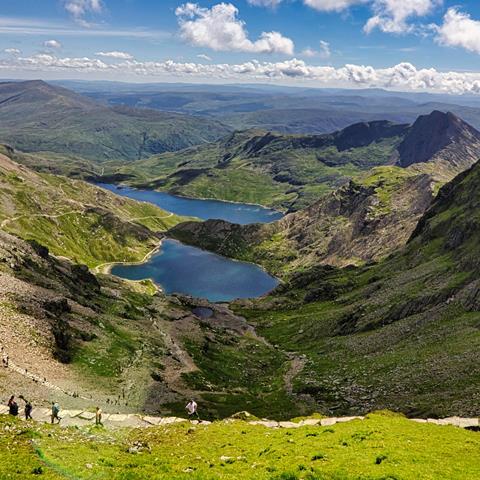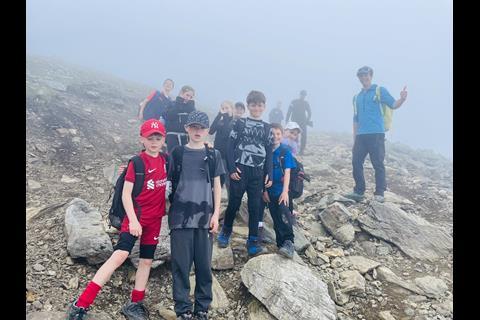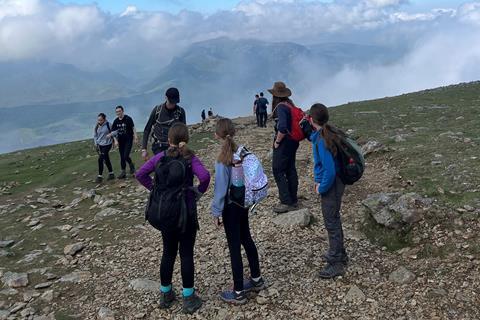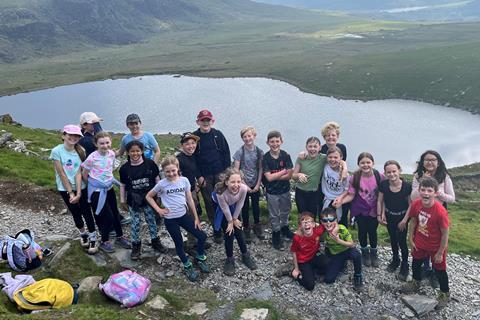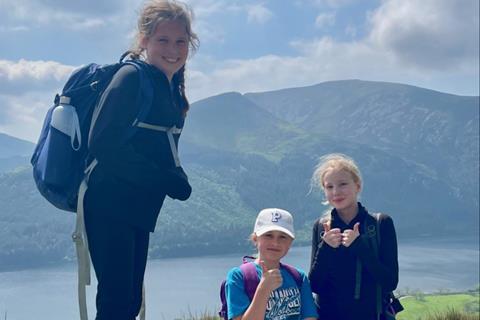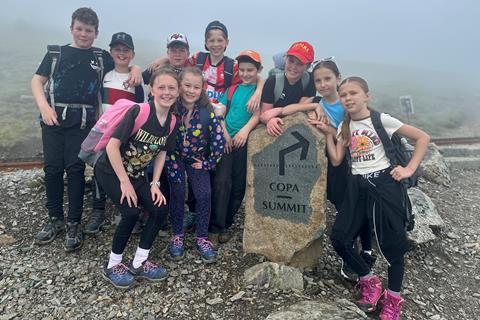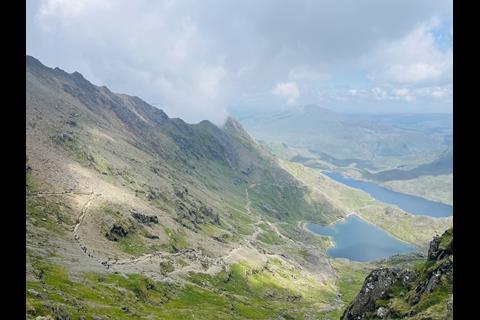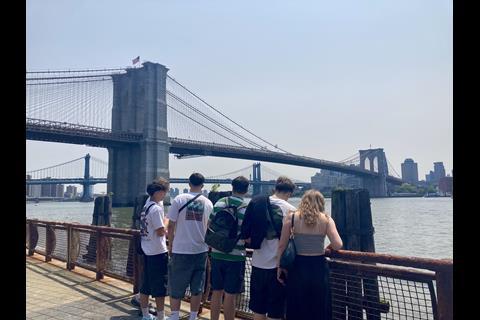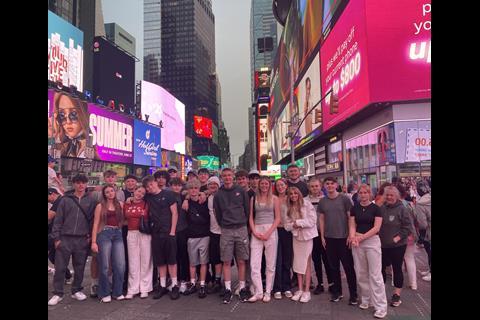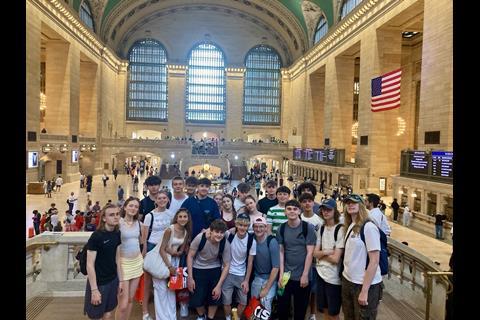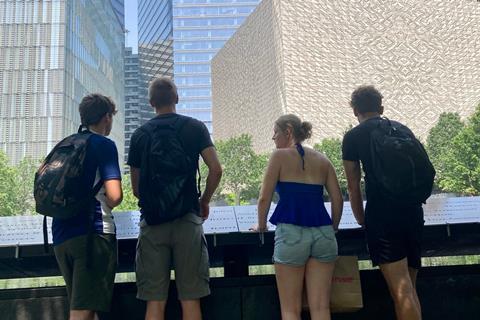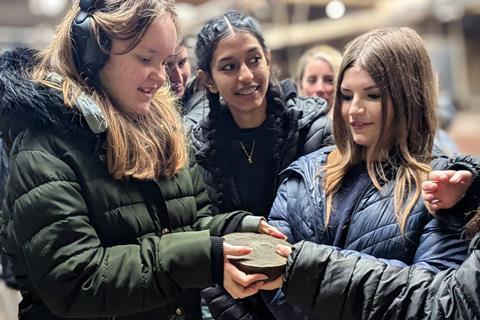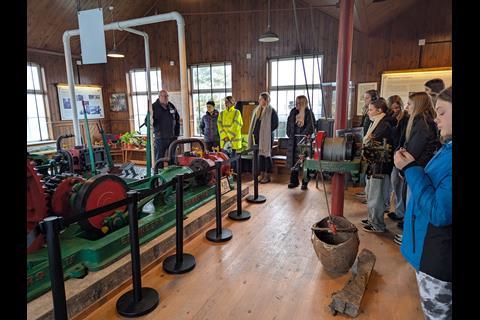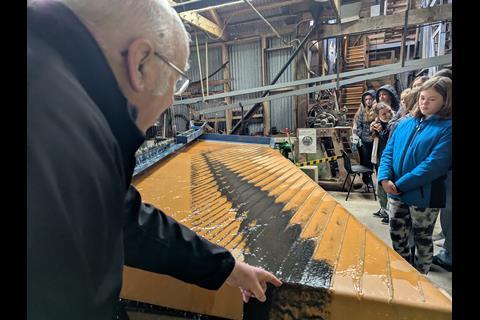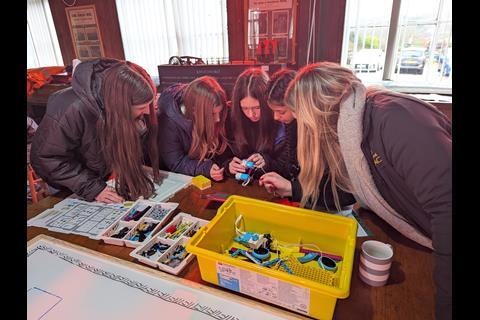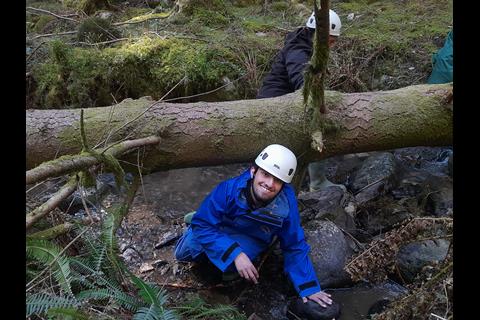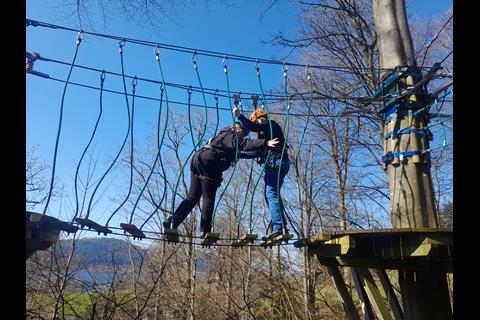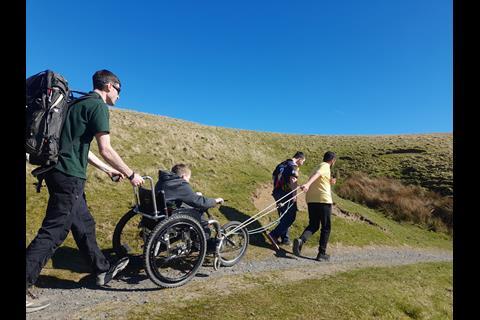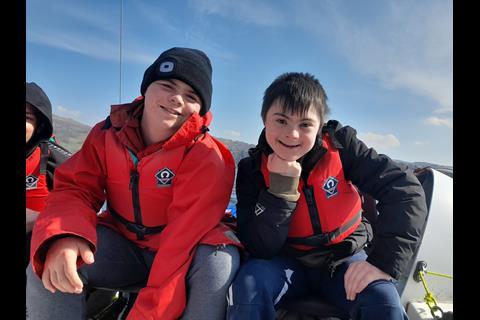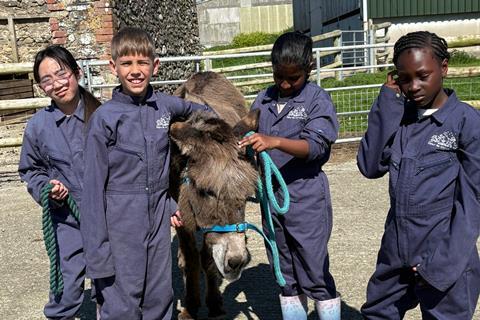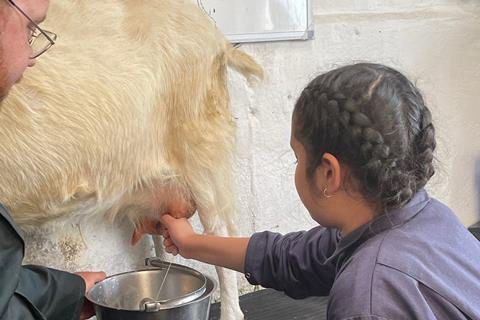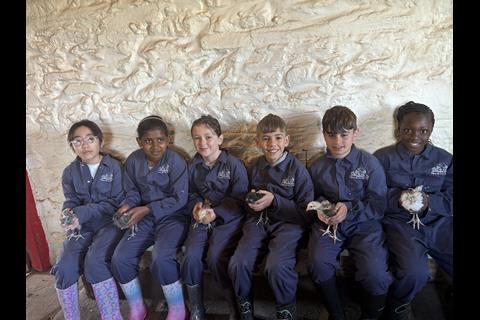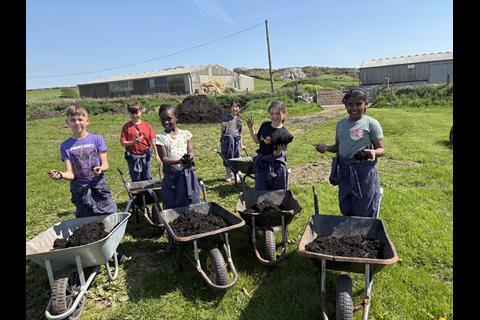These school trips cover everything from a STEM day visit to a farm residential and a trip to New York. In fact, they’re so good they’ve been shortlisted for this special award.
The ‘My Best School Trip’ Award recognises outstanding educational visits, because great learning outside the classroom gives children a rich and rewarding experience, achieves a range of objectives and helps embed learning back in school.
The 2025 finalists are great examples of what can be achieved from school trips - and how they can be embedded to create a long-lasting impact.
The winner for 2025 is… St Woolos Primary School, Newport for their Year 5 residential to Lower Treginnis Farm!
Congratulations to them - they were announced as the winners at the School Travel Awards ceremony in London on Friday 21s November.
The finalists for the ‘My Best School Trip’ Award 2025
Our judging panel assessed a short-listed collection of entries and decided on five finalists as well as the overall winner.
All commenting on the incredibly high standard again this year, the judges thoroughly enjoyed reading all of the entries. We take a look at the five amazing finalists and the impact of their school trips…
Abbeymead Primary School, Gloucester, for their Year 5/6 Snowdon adventure
Entered by: Amy Coole, assistant headteacher
This was “more than just a school outing”, it was a “shared journey of courage, perseverance and growth” with the children proving that they’re capable of extraordinary things.
Carefully planned to link meaningfully with multiple subjects, the impact of the residential in Wales has been long-lasting, not least for a new-found love for walking and the outdoors among children and the staff.
For many of the children it was their first time away from home, their first encounter with a mountain, and their first experience of being pushed to their physical and mental limits. The group stayed in the YHA and Lost Earth Adventures provided mountaineers to accompany them up and down Snowdon.
Amy said: “It wasn’t just a physical challenge; walking for hours through changing weather, over rocky paths and steep climbs demanded focus, inner strength, and a positive mindset. Tiredness crept in but so did pride and grit.
“The young adventurers pushed themselves further than they ever thought possible. For many, it was their first time experiencing such a dramatic and awe-inspiring landscape. Towering peaks and winding valleys they’d only seen in geography lessons suddenly became real.”
A key aim of the trip was to encourage children to lead active, healthy lifestyles by showing them how rewarding physical activity in the great outdoors can be. They wanted to inspire a love for nature, movement, and adventure, far beyond the classroom or playground.
“A huge sense of achievement. I couldn’t believe we made it all the way to the top - this truly was one of the best times ever and I will always cherish the beautiful memories made with my lovely friends and amazing teachers.”
Pupil comment
Learning objectives included personal growth, team building, and outdoor education, as well as promoting physical and emotional wellbeing. Amy added: “Ultimately, we hoped the trip would leave each child feeling proud, empowered, and inspired—and it absolutely did.”
There were links with geography, science, PSHE and PE, and with inclusivity and affordability central to the planning, staff ensured that all children, regardless of background or need, had the opportunity to take part using Pupil Premium funding and a flexible payment plan to help families.
The legacy of the trip has been ‘incredibly powerful and long-lasting’ with children in the group now wanting to go walking and to spend time outdoors, in addition to developing increased confidence and a change in behaviour and attitude.
Diss High School, Norfolk, for their Year 12 trip to New York
Entered by: Samantha Budds, head of vocational faculty
The objectives of this four-night residential were far-reaching; it had specific links to the Business and Travel and Tourism curriculum as well as personal development goals, communication skills and building resilience.
Students spoke about going out of their comfort zone and having a ‘once in lifetime experience’ that will stay with them forever.
During the trip, they visited many places including Wall Street and the Financial District, Brooklyn Bridge, Empire State Building, Central Park, 9/11 Memorial, Times Square, Grand Central Station and the Rockefeller Centre.
In planning the trip, staff took into account that this particular year group had been significantly impacted by Covid with interruptions and trips cancelled.
Samantha said: “We decided that we wanted to give them the opportunity to not only travel abroad but to visit somewhere that would have a lasting impression upon them and open their eyes to the opportunities beyond our small town.”
Using funding from the Turing Scheme, the cost of the trip was significantly reduced with some students receiving a bursary which meant that the total amount was paid for them.
The residential had specific links to the Business and Travel and Tourism curriculum but the other aim was to build links to specific businesses which was achieved through talks arranged at Hershey’s and Macys. Other objectives revolved around personal development, independence, communication skills and resilience.
“Overall, the trip to New York was much more than just sightseeing. It was a valuable educational journey that broadened my perspective, deepened my learning, and strengthened my sense of community.”
Pupil comment
Samantha told us: “We can already see how much this trip has impacted our students. They are currently working on a piece of business coursework where they are investigating entrepreneurship. They are using Milton Hershey as an example and are drawing on information from our talk and visit to Hershey’s World while in New York.
“Both parents and students have talked about their wider aspirations and how it has shown them what is possible. They have greater independence and are more resilient to change and open to new ideas and new ways of doing things.”
Falmouth School, Cornwall, for their Year 9 Girls in STEM day trip to King Edward Mine
Entered by: Jess Warden, design and technology teacher
Seen as an opportunity to inspire more female students to consider pathways in Design and Technology and Engineering at GCSE and beyond, Jess carefully planned the visit to combine hands-on learning, real-world STEM applications and engagement with female role models.
Students took part in workshops, met professional women in STEM fields, toured the historic mine, and participated in robotics challenges. As a volunteer coach for the school’s LEGO League robotics club, Jess also wanted the trip to help students develop or be introduced to robotics skills, supporting their personal growth and preparing them for future competitions.
The main learning objectives were were to boost confidence in STEM subjects, foster teamwork and problem-solving skills, and inspire students - especially girls - to see themselves in STEM careers.
Jess said: “We hoped the trip would open their eyes to the exciting opportunities available, increase enthusiasm for Design and Technology, and encourage more girls to choose it as a GCSE option. Overall, the trip aimed to combine cultural heritage with cutting-edge STEM learning to motivate and empower our students.”
In addition to STEM, the day trip had links to history, geography, English and British values as well as reinforcing teamwork and personal responsibility, aligning with the school’s values.
“The chance to speak with women in a field that I now want to work in was phenomenal. I learnt lots about engineering and DT, and learnt about an ideal career path that I would really like to take.”
Pupil comment
The success of the visit was measured through a combination of student feedback, observation and tangible outcomes relating to the learning objectives.
Jess added: “The trip inspired continued conversations around STEM careers, helping to embed a long-term interest and motivation in pursuing STEM pathways—especially among girls. Our Design and Technology department is growing and we are helping close the gap between girls and boys opting for our subject.
“Most importantly, most of the girls are now considering jobs within STEM as a direct result from this trip.”
Southgate School, Huddersfield, for their residential to the Calvert Trust in the Lake District
Entered by: Ben Walker (outdoor education coordinator) and Susan Norman (staff governor)
Taking on challenges such as catamaran sailing, canoeing and horse riding, the aim of this four-night trip was to challenge disability and ‘give pupils the chance to overcome barriers and reach their potential’. It did that and more.
The school has a strong belief that outdoor education ‘fosters independence, confidence and personal growth’ and this particular trip was designed to provide ‘enriching, hands-on experiences tailored to the diverse needs of the students’.
Planning involved extensive coordination with the Calvert Trust to accommodate the specific disabilities and learning difficulties of the pupils. Careful consideration was given to accessibility, ensuring that all activities, from canoeing and climbing to sensory nature trails, were adapted to their abilities.
Support staff and specialists were involved to provide guidance, and parents were consulted to ensure the trip aligned with the individual needs of each child.
Ben said: “The anticipated impact was profound. Beyond the physical activities, the trip aimed to enhance social skills, communication, and teamwork.
“Many students had never experienced such an immersive outdoor setting, and the hope was that they would develop resilience and a sense of achievement through overcoming challenges.”
“Before the trip, I wasn’t sure I could do activities like canoeing or climbing, but with the support of my teachers and friends, I did things I never thought possible.”
Pupil comment
Inclusivity and affordability were central to the planning of this trip, ensuring that every pupil, regardless of their needs or financial background, could fully participate. And once back at school, the pupils took part in guided discussions to share their experiences and reflect on the challenges they overcame using visual aids such as photographs and a diary used to document their journey.
Parents fed back how much their child had enjoyed the trip, noticing improvements in their child’s confidence, communication and independence.
Susan added: “Overall, the learning experience extended beyond the trip itself, shaping a culture of perseverance, inclusion, and active participation within the school community.”
St Woolos Primary School in Newport, Wales, for their Year 5 residential to Treginnis Farm - 2025 winners
Entered by: Rhian Milton, head teacher
The purpose of the week-long stay at the Farms for City Children site was clear – to improve the children’s understanding of food and the impact that food and the outdoors can have on our health and wellbeing. It was a deep and immersive learning experience that has created a long-lasting legacy.
The children took on so many responsibilities, not least tending to the animals, including milking the goats, fixing buildings, harvesting produce and preparing and cooking meals.
Rhian said: “Our main reason for seeking this kind of residential experience was to improve the children’s understanding of food and the impact that food and the outdoors can have on our health and well-being.
“We also wanted a learning experience that we were able to bring the learning back to school and it have a long lasting impact and be a huge part of the St Woolos curriculum.”
It was designed to be a ‘deep, immersive learning experience’ that aligned not only with the specific needs of the students but also the Welsh Curriculum.
Inclusive, embedded and carefully planned, the outcomes have been noticeable across pupil attitudes, behaviour, engagement and the quality of learning back at school.
Rhian added: “The experience has influenced classroom projects, informed healthy eating initiatives, and inspired outdoor learning back at school. For our children - many of whom live in areas where access to nature is limited and safety is a concern - this residential was life-changing. It gave them the confidence to explore, the belief that they belong in the outdoors, and the understanding that their choices matter.”
“On the first day at the farm, I was quite scared and anxious about going, but after a while, I really enjoyed it. I feel like I got closer to my friends, and I enjoyed spending more time with them.”
Pupil comment
Pupil voice was central – structured reflection sessions and informal discussions were held before and after the trip and the cost of the trip was significantly subsidised so that nobody missed out. The school even sourced waterproofs, wellies and outdoor gear through donations, school supplies and local community support.
Rhian said: “Above all, our approach was rooted in the belief that every child deserves access to experiences that can transform their learning and wellbeing. The trip to Lower Treginnis was not a reward or a luxury - it was a vital part of our curriculum and our commitment to equity.
“We are proud that all our Year 5 pupils were able to attend and benefit equally from this unique opportunity.”
Thank you to everybody who entered a trip and took part in the 2025 ‘My Best School Trip’ Award, and congratulations to our five finalists.
Also a big thank you to this year’s judges who were:
- Peter Carne, OBE, Learning Outside the Classroom (LOtC) Manifesto Champion
- Gill Harvey, external affairs and membership director, School Travel Forum
- Anne Hunt, chief executive officer of the Council for Learning Outside the Classroom
- Keeley Rodgers, editor, School Travel Organiser
- Rob Yandell, publisher, School Travel Organiser
The winner was announced at the School Travel Awards ceremony on Friday 21st November at the Royal Lancaster Hotel, London.
For schools interested in entering next time, head to our ‘My Best School Trip’ Award page for more information, and make sure you’re subscribed to our free newsletter to stay up to date.
